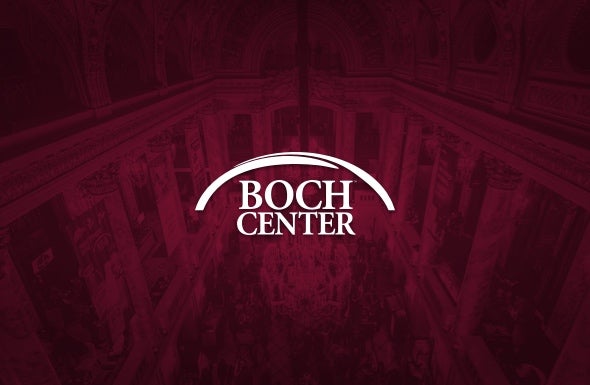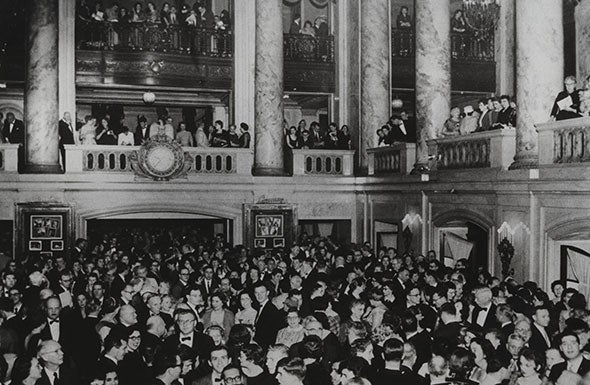Theatre History
Wang Theatre History
The performing arts have enjoyed a rich and distinguished history in Boston, reaching back nearly 200 years when Charles Bulfinch designed the city’s first playhouse in 1794. With over 95 years of history, the Wang Theatre remains a vital part of Boston’s cultural life and the anchor of Boston’s historic Theatre District.
1925 - The Metropolitan Theatre
Opened in 1925, "The Met," as it was called, was developed by Max Shoolman and designed by Clarence Blackall, a leading American theater architect. Blackall also designed 12 other major Boston theaters, among them the Emerson Colonial Theatre and Wilbur Theatre, as well as the Copley Plaza Hotel.
At that time, The Metropolitan was hailed as a magnificent movie "cathedral," reminiscent of the splendor of a Louis XIV palace and was considered historically the most important Boston landmark of "the Roaring Twenties." Rivaled by few other theaters in the world, its glittering crystal chandeliers and imposing columns and doorways of imported marble formed an elegant setting for thousands of patrons who came to be entertained by motion pictures, big bands and vaudeville.
1962 - The Music Hall
Renamed The Music Hall in 1962, the theatre became home to the newly-formed Boston Ballet. During the 60s and 70s, Music Hall audiences also enjoyed the Stuttgart Opera, the Metropolitan Opera, Bolshoi Ballet and Kirov Ballet as well as popular movies and performing artists. However, as years passed, the Theatre's splendor started to dim. Its once grand stage was viewed as too shallow and its production facilities too outmoded to accommodate large touring shows. Consequently, Boston's prominence as a major venue diminished and it was bypassed by many touring companies.
1980s - Wang Family Gift Funds Restoration
In 1980, the Theatre converted to a nonprofit organization known as The Metropolitan Center and renovations to the stage and backstage attracted Broadway's Sweeney Todd with Angela Lansbury, Peter Pan with Sandy Duncan and My Fair Lady with Rex Harrison. An extraordinary gift in 1983 from Dr. An Wang, founder of Wang Laboratories, ushered in the era of The Wang Center for the Performing Arts. Dr. Wang's gesture invigorated Boston's cultural community and drew the help of corporations and individuals dedicated to preserving the Theatre. In the late 80s, pure chutzpah and ambition raised $9.8 million to return the Theatre to its glory days of the 1920s.
1990s - Wang Center for the Performing Arts
Since its restoration, the Wang Theatre has hosted an impressive array of world-class theater, music, dance and film. The Theatre broke box office records with musicals such as Les Miserables and The Phantom of the Opera and hosted productions such as Riverdance, the Radio City Christmas Spectacular, Sunset Boulevard, Alvin Ailey’s American Ballet Theater, Whitney Houston, the Eagles, Harry Connick Jr. and Lady Gaga. The Wang Theatre was one of only a handful of venues around the world capable of accommodating the national touring company of the smash hit musical Miss Saigon and the many technical and special effects that the production required.
For many years, with help from special celebrity guests The Wang Center presented its Classic Film Series, returning to the roots of the Theatre with classic films such as Casablanca, All About Eve and An American in Paris shown on one of New England's largest screens. The Wang Theatre has also been represented on the small screen by hosting live recordings of the nationally-televised game shows The Wheel of Fortune and Jeopardy.
1990s - Community Growth
In 1994, with sustained financial stability and a fully retired debt, The Wang Center had achieved its original goals. Encouraged by these successes and inspired by its broadening mission to bring the arts to everyone, the Board of Trustees directed the staff to begin a multi-year investigation into the possible production of original, innovative programming and the acquisition of additional stages.
The Wang Center launched its new direction by expanding its community outreach efforts and initiating exciting new programs. In 1994, it expanded its ethnic programming to include community gospel events and multicultural showcases. In 1996, the Wang Center announced its plan to operate and manage the Shubert Theatre as a home of many local nonprofit performing arts organizations. Since then, the Wang has given millions of dollars in grants as well as reduced-rent rehearsal and performance space to organizations including Boston Ballet, Boston Lyric Opera, Celebrity Series of Boston and World Music.
2006 - Citi Performing Arts Center
The Wang Center also ventured into new areas of programming, including the family shows Arthur's Live Adventure and Blues Clues Live!, as well as non-traditional theatrical events such as Burn the Floor and the North American premiere of Blast! These efforts helped introduce live theater to an entirely new audience while expanding the cultural experience of current patrons. In 2006, the Wang Center announced a long-term partnership with Citigroup to further promote the vision and programming of Boston's pre-eminent performing arts center. The landmark alliance was heralded by the new name of Citi Performing Arts Center, which managed the Wang and Shubert Theatres until 2016.
2016 - The Boch Center
Through a landmark, multi-year naming sponsorship with the Boch Family, the Center was renamed the Boch Center in September 2016 and continues to manage the Wang and Shubert Theatres today.
Today - A True Community Arts Center
Just as the city and audience have evolved with the times, the Boch Center, as guardian of the Wang and Shubert Theatres (and from 2012-15, the Center also managed the historic Emerson Colonial Theatre), has changed to meet the needs of its community. Uniquely using a Balanced Scorecard (a Fortune 500 management framework), strategy map, and strategic dashboard, the Boch Center ensures that our Theatres and programs stay relevant to the community we serve. Today, the Boch Center is considered a best practice institution and nonprofit arts leader.. With the belief that arts make and keep us a civilized nation, the Boch Center is dedicated to providing high-quality, diverse and culturally relevant arts and entertainment, and arts education programming for New England residents and visitors.
Shubert Theatre History
1910 - Opening Night
Since its opening on January 24, 1910, the Shubert Theater has enjoyed a rich history of world premieres and memorable performances. Originally a stage for Shakespeare’s plays, the theatre evolved as an ideal venue for pre-Broadway tryouts, presenting classics like The King and I, South Pacific, Camelot, and Mame. These productions brought with them legendary performers including Sir John Gielgud, John Barrymore, Richard Burton, Mary Martin, and Julie Andrews. After the opening of The Taming of the Shrew in 1910, its first production, The Boston Globe reported, "The portion of the public, which has been fortunate enough to secure tickets, will be privileged to see and enjoy one of the coziest and daintiest playhouses in the country. It is indeed a gem and Boston has reason to be proud."
1996 - Little Princess Joins the Grand Dame
In February 1996, the then-called Wang Center for the Performing Arts entered a 40-year lease agreement for the Shubert Theatre. "If the Wang Theatre is the grand dame of Boston theatres, then the Shubert is the little princess," said Josiah A. Spaulding, President and CEO of the Boch Center. "The Shubert's scale and rich theatrical history make it the perfect complement to the grandiose Wang Theatre. Together they symbolize the full tradition and magic of Boston's entertainment industry."
1996 - A New Beginning
In October 1996, the newly renovated theatre reopened to premiere Jonathan Larsen’s Tony and Pulitzer Prize-winning musical, Rent. The $3 million renovation included increased accessibility for patrons with disabilities, a new stage, an expanded orchestra pit and updated electrical and mechanical systems. In the winter of 1998, the then-called Wang Center bestowed a $1 million grant to fellow nonprofit Boston Lyric Opera (BLO). As part of this special partnership, the Shubert Theatre was the BLO’s home for 18 years. The organizations also partnered on a co-production Rachel Portman’s opera The Little Prince in February 2005.
2003 - Community Arts Center
The theatre has also been home to several productions as partnerships with other local arts organizations. In 2003, World Music’s Flamenco Festival brought Juana Amaya y Farruquito and Ballet Flamenco Sara Baras to the Shubert. After the devastating fire at the North Shore Music Theatre in 2005, productions of Abyssiniaand Camelot were moved to the Shubert Theatre rent-free. In September 2006, the then-called Citi Performing Arts Center partnered with the Handel and Haydn Society to present a fully staged production of Monteverdi's L'Orfeo at the Shubert. Over the years, the Boch Center has partnered with Celebrity Series of Boston hosting groups like the Mark Morris Dance Group, Pilobolus, Alvin Ailey American Dance Theater, and Paul Taylor Dance Company as well as the “Dance Across the City” program.
1910 - 2010 Broadway Darling
The Shubert has hosted Broadway sensations like Cats, Dreamgirls, Les Miserables, La Cage Aux Folles, Carousel, Steve Martin’s Picasso at Lapin Agile, Death of a Salesman with Brian Denehey, Penn and Teller, and the smash hit Jersey Boys. Designed by architects Charles Bond and Thomas James, the Shubert Theatre has been home to an impressive list of international stars such as Sarah Bernhardt, W.C. Fields, Mae West, Humphrey Bogart, Ingrid Bergman, Henry Fonda, Rex Harrison, Zero Mostel, Helen Hayes, and Cary Grant. As part of the Boch Center’s annual City Spotlights program, the theatre has also hosted local artists such as Lisa and Louie Bello of The Bello Project, Mattahunt All-Stars Step Team, Stajez Dance Company, Gund Kwok Lion & Dragon Dance Troupe, break-dancing troupe The Floorlords, B-Boy Tappa Shaquan Reed, A Major Dance Co., and Colombian folkdance company Bajucol. Former Governor Deval Patrick chose to host his Youth Inaugural at the theatre in 2007.
Today - A True Community Arts Center
Just as the city and audience have evolved with the times, the Boch Center, as guardian of the Wang and Shubert Theatres (and from 2012-15, the Center also managed the historic Emerson Colonial Theatre), has changed to meet the needs of its community. Uniquely using a Balanced Scorecard (a Fortune 500 management framework), strategy map, and strategic dashboard, the Boch Center ensures that our Theatres and programs stay relevant to the community we serve. Today, the Boch Center is considered a best practice institution and nonprofit arts leader. With the belief that arts make and keep us a civilized nation, the Boch Center is dedicated to providing high-quality, diverse and culturally relevant arts and entertainment, and arts education programming for New England residents and visitors.

